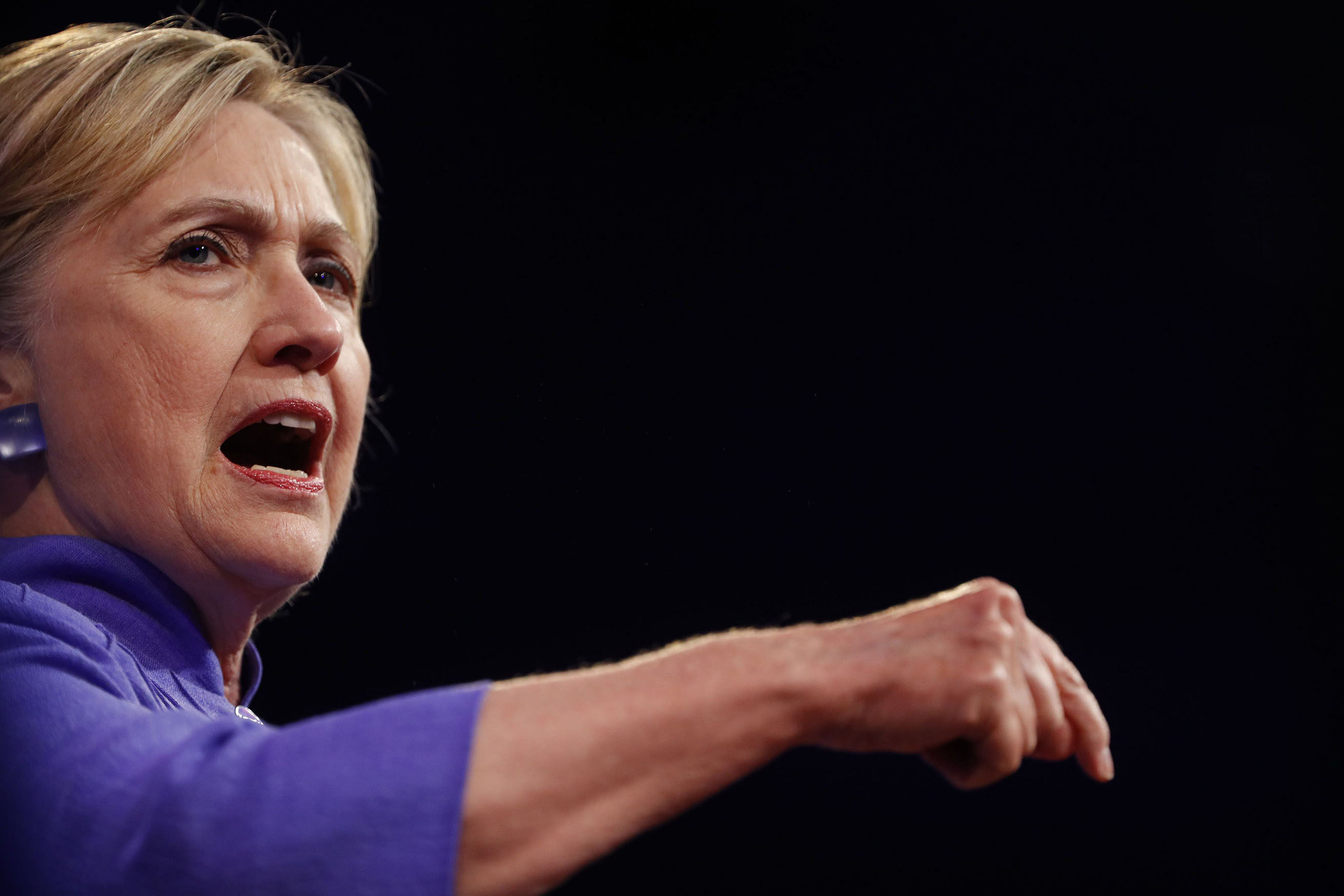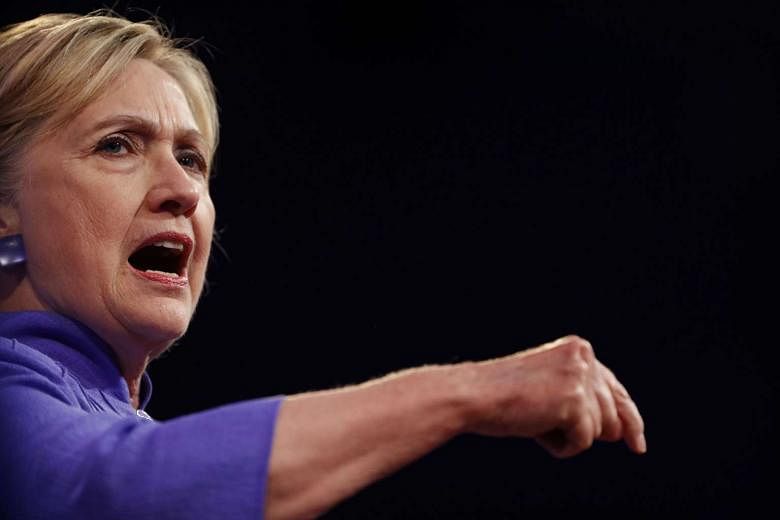Hillary Clinton watched as the tension in the Hanoi Convention Centre slowly mounted. First, the Vietnamese foreign minister rose to criticise China's actions in the South China Sea. Then, one by one, other ministers from Asean raised similar concerns about Chinese bullying.
Sensing her moment, the US secretary of state asked to speak to the regional summit. For the first time, she announced that Washington had a "national interest" in freedom of navigation and international law in the South China Sea. The Chinese were irate. Mr Yang Jiechi, the foreign minister, looked at Mrs Clinton and warned "outside powers" to stay out of the South China Sea disputes. Turning to the other countries, he fumed: "China is a big country. And you are all small countries. And that is a fact."
Of the 1,539,700km Mrs Clinton travelled and the 112 countries she visited as secretary of state, the 2010 Hanoi meeting was in many ways the defining moment of her tenure. And it provides a valuable glimpse of the worldview that the Democratic nominee would bring to the White House if she wins the November election.
For the Obama administration, the "pivot" to Asia is its signature foreign policy initiative. After 200 years of primarily looking east towards Europe, the US decided that its main priority is the Asia-Pacific.
By inserting the US directly into the arguments over the South China Sea, Mrs Clinton's Hanoi statement was, in effect, the launch of the pivot, the moment the US declared to the region - and to Beijing - that the US would not sit aside as China tried to establish itself as the regional leader.
The phrase itself comes from an October 2011 article in Foreign Policy magazine by Mrs Clinton. In "America's Pacific Century", she talked about the country being at a "pivot point". While President Barack Obama will use an Asean summit in Laos that started yesterday to cement the pivot as part of his own legacy, the reality is that it was very much a joint project between the President and the woman he hopes will succeed him.

For some US officials, including a few angling for senior positions in a future Clinton administration, the Hanoi meeting is evidence that she would be prepared to adopt a tougher approach to China. In Beijing, the meeting reinforced the impression that she was the principal China hawk within the Obama administration.
"They have a good notion that the chances of Mrs Clinton winning the election are very high and so they will have to deal with her," says Mr Douglas Paal, an Asia expert who worked in the Reagan and George H.W. Bush administrations. "But every Chinese will say privately they really don't like her."
These tensions set the stage for what will be one of the central challenges facing the next president. The new, more confrontational US approach, first signalled by Mrs Clinton in Hanoi, has not persuaded the Chinese to abandon their plans for the South China Sea. As a result, the new administration will face a choice between doubling down on the same strategy or trying to find some way to accommodate Chinese demands.
From the outset of the first administration in January 2009, both Mr Obama and Mrs Clinton were in swift agreement that Asia would be a priority. Her first major speech in office was at the Asia Society in New York the following month, when she spoke of "America's desire for more rigorous and persistent commitment" to the region. Yet there was also a desire within the administration not to start off on the wrong foot with China during the first year, as so many new presidents had done - especially given the crisis ripping across the global economy.
It was with this in mind that Mrs Clinton said ahead of her visit to Beijing, also in February 2009, that she would not make a big deal about human rights because "we pretty much know what they are going to say" - a remark that won her fierce criticism at home for appearing to let Beijing dictate terms.
By early 2010, the administration started to become less wary of offending Beijing. Mr Obama met the Dalai Lama, the exiled Tibetan spiritual leader, and announced a package of arms sales to Taiwan, while China was also lobbied to back a UN resolution on Iran.
It was the South China Sea issue, however, that led the administration into a much more direct confrontation with China that year. US officials were already worried about increased Chinese naval activity in the area and the absence of any diplomatic process to resolve the various territorial disputes. They began to suspect that China was stepping up plans to try to exert control over the South China Sea.
In her memoir Hard Choices, Mrs Clinton says she started to become concerned about the South China Sea at the May 2010 Strategic and Economic Dialogue in Beijing. The Chinese started to refer to the South China Sea as a "core interest" alongside Taiwan and Tibet - in other words, a subject on which there could be no flexibility.
"They warned that China would not tolerate outside interference," she wrote. "On the flight home from Beijing, I took stock with my team. I thought China had overplayed its hand."
The administration decided to start calling out Beijing over its actions in the South China Sea. Mr Jeff Bader, then Asia director at the National Security Council, and former assistant secretary of state Kurt Campbell prepared the ground before the Hanoi meeting by briefing governments that harboured complaints about the Chinese. Over the past few years, the US has expanded security cooperation with Vietnam and the Philippines, both of which are involved in territorial disputes with China, and backed a court case brought by the Philippines. An international tribunal ruled in July that many of China's claims in the South China Sea were unlawful.
For all their occasional disagreements on the Middle East, Mr Obama and Mrs Clinton were much more aligned when it came to Asia. Indeed, the biggest competition within the administration was over who should take credit for the strategy - the White House or the State Department - not over its ideas.
"There were times when Tom Donilon (a former national security adviser) thought she was too tough on China, or Jeff Bader. But not Obama," says one former senior official. "He never really had any romantic attachment to the idea that we need to always have smooth Sino-US relations."
The one exception was over the case of Mr Chen Guangcheng, the blind activist who took refuge in the US Embassy in Beijing in 2012 and who - after several days of negotiations while Mrs Clinton was in Beijing for a summit - eventually received asylum in the US. According to senior officials, Mr Obama was highly critical of the State Department's decision to let Mr Chen into the US Embassy.
Along with the Hanoi meeting, the stand-off over Mr Chen was another piece of evidence for those in Beijing who believe Mrs Clinton to be a relatively hardline voice about China, both on security issues and human rights. Indeed, Chinese suspicions about Mrs Clinton date back to the 1995 World Conference on Women in Beijing, when she insisted that "women's rights are human rights and human rights are women's rights" - remarks that were not broadcast in China.
As a result, many analysts in China would expect a prospective Clinton administration to be more willing to confront Beijing. "She has always been hard on China since her first visit in 1995," says Tsinghua University international relations expert Chu Shulong. "That's her style." Renmin University international relations expert Shi Yinhong agrees: "Hillary will be tougher on China than Obama."
From the start, the decision to push back against China in the South China Sea and the increasing US presence in the region have won strong, bipartisan support in Washington, where there are few disagreements with the basic ideas of the pivot. Within the administration, the only real debate has been about the pace of US naval operations in contested areas in the South China Sea.
However, the pivot has not been without its critics. Mr Hugh White, a former Australian defence official and an influential observer on Asia, believes the US is not prepared for the huge risks and costs that would be required to actually shift China's strategy. "The pivot's architects assumed that a merely symbolic reassertion of US power and resolve would be enough to make China back off," he argues. "China's assertive posture in the East and South China Sea today is strong evidence that they were wrong."
So how would president Clinton act in Asia? For all her input in defining the Obama administration's strategy to the region, during the election campaign she has turned against one of its central planks, the 12-nation trade deal known as the Trans-Pacific Partnership. (China is not involved in TPP.)
Should Mrs Clinton win the election, the ideal situation for her would be for Congress to approve the trade deal before her inauguration. But if that does not happen, she would face the difficult choice of whether to reopen an agreement which she has described as central to US influence in the region, but which she now believes to be flawed in practice. At the ongoing Asean summit in Laos, Mr Obama will try to reassure Washington's regional partners that the trade agreement still remains on track.
One former US official who worked closely with the Obama administration on China argues that Mrs Clinton would push more strongly on commercial issues and would be far less patient with the restrictions Beijing places on doing business in its own market.
"I don't think she'll be willing to park the competitiveness agenda as it relates to China to get, say, a global climate deal," he adds. "President Obama wanted China's help on the Iran deal, he wanted the climate deal and he was willing to shelve other more nettlesome issues in order to get them."
The sharpest dilemma would be on the South China Sea. The approach Mrs Clinton started to outline in Hanoi in 2010 was to pressure China to back away from efforts to dominate the region, by demonstrating the regional and US opposition. Instead, Beijing has plunged ahead full speed, dramatically increasing, over the past three years, its efforts to build artificial islands that might one day serve as military bases.
Among Mrs Clinton's Asia advisers, the approach being debated is a slightly stepped-up version of the Obama pivot - a series of steps aimed at forging a deeper network of allies and partners that can act as a deterrent to China and reinforce US ideas about trade and freedom of navigation.
The sorts of proposals being discussed include having another aircraft carrier permanently stationed in the region; expanding missile defence in South Korea; increased deployments to the island of Guam; and sending more planes and ships to the Philippines.
"They sound like small, incremental steps, but over time they will add up to a regional framework that can influence China's rise," says one former official advising the Clinton campaign. The Clinton team is still betting, in effect, that China has overplayed its hand.
THE FINANCIAL TIMES

